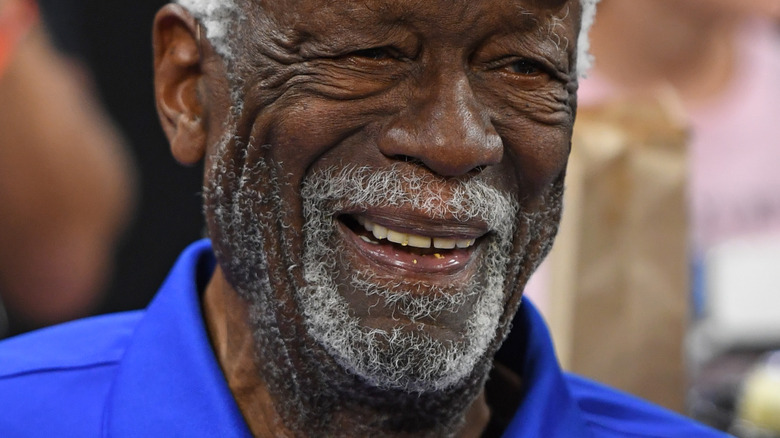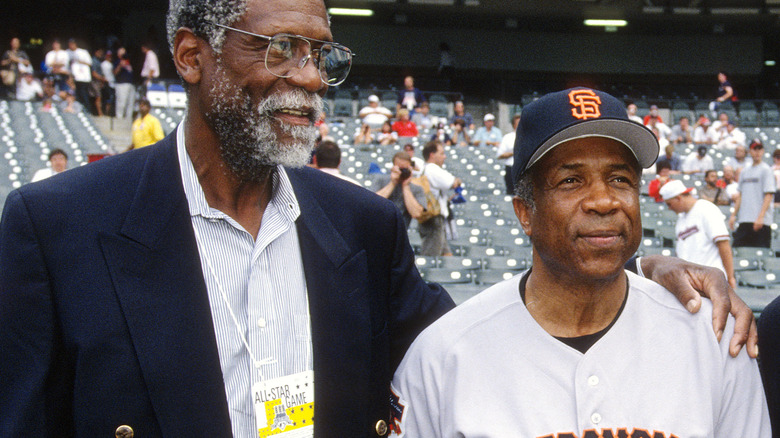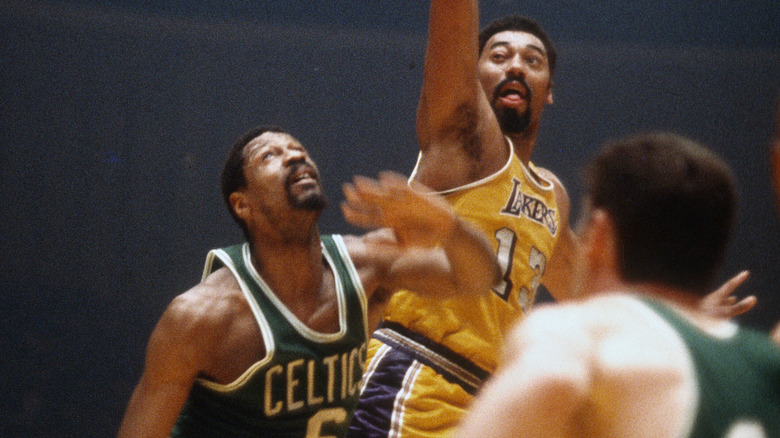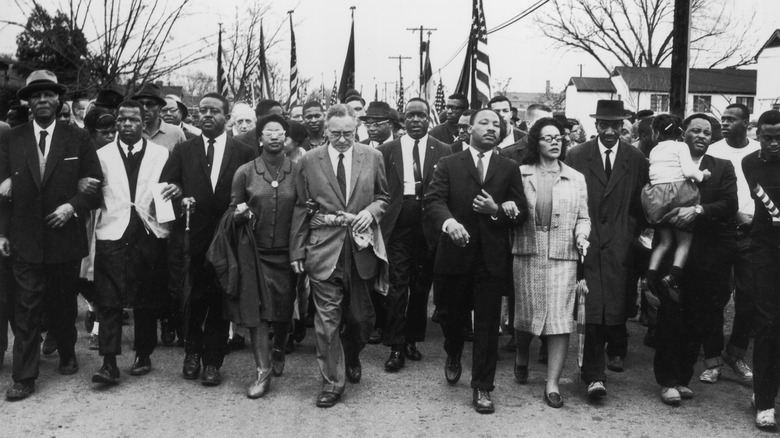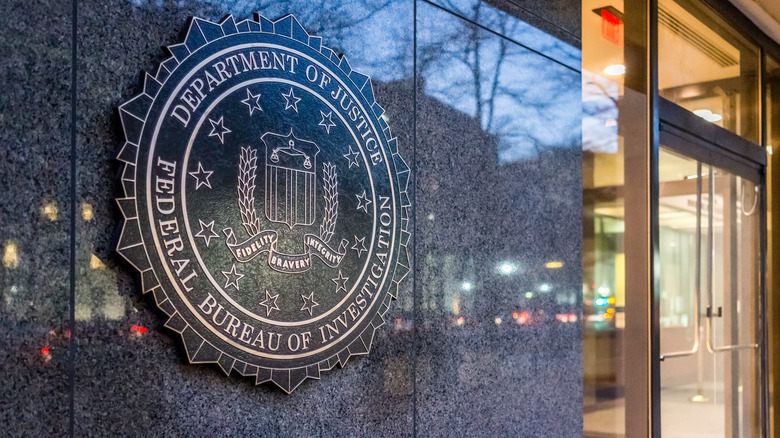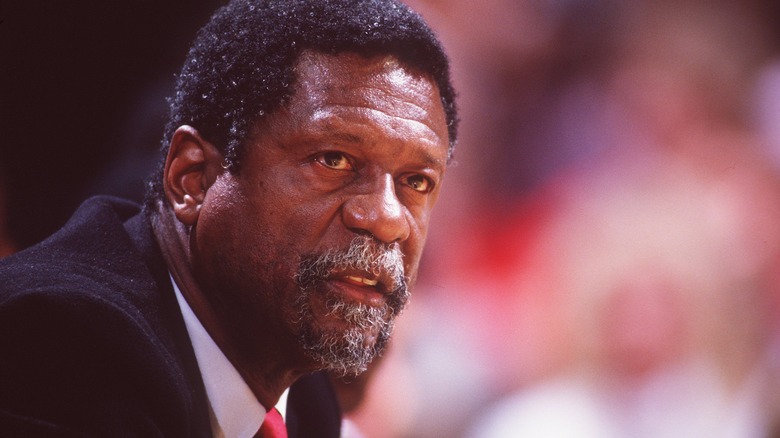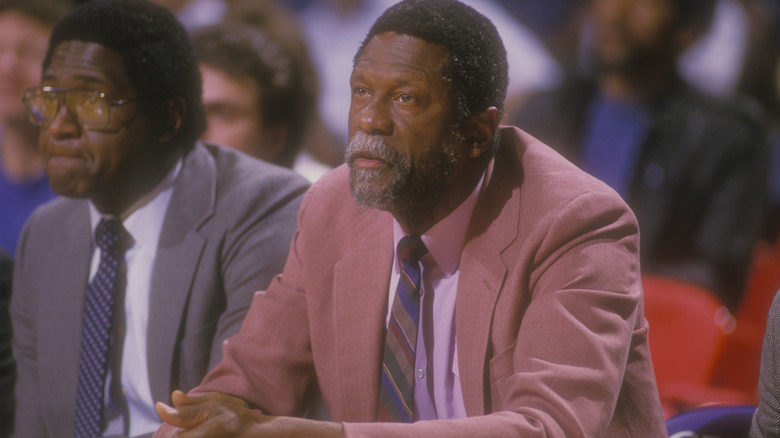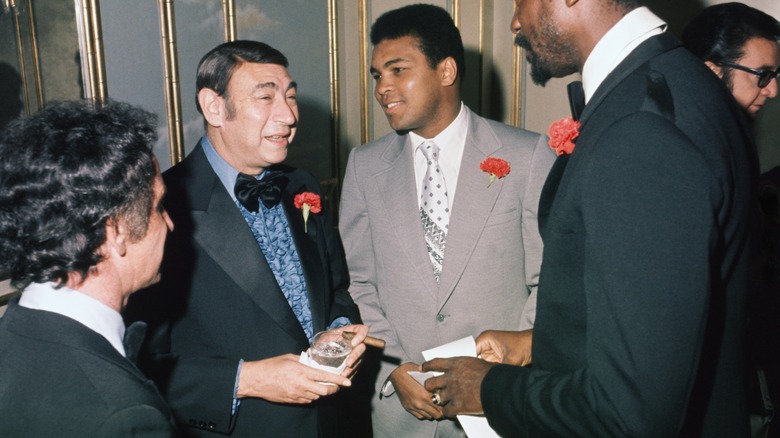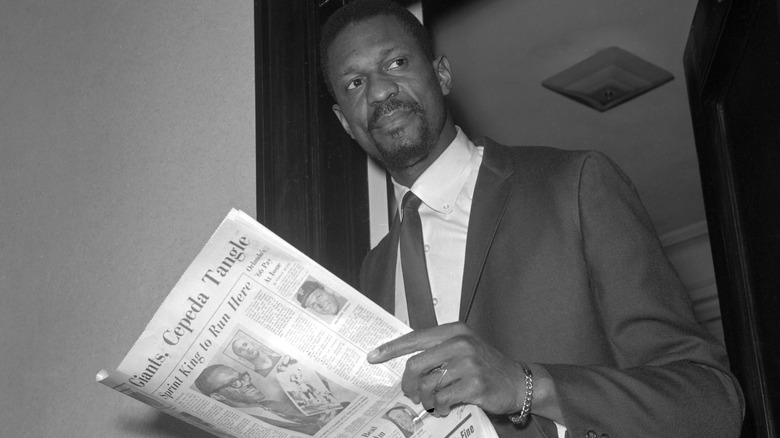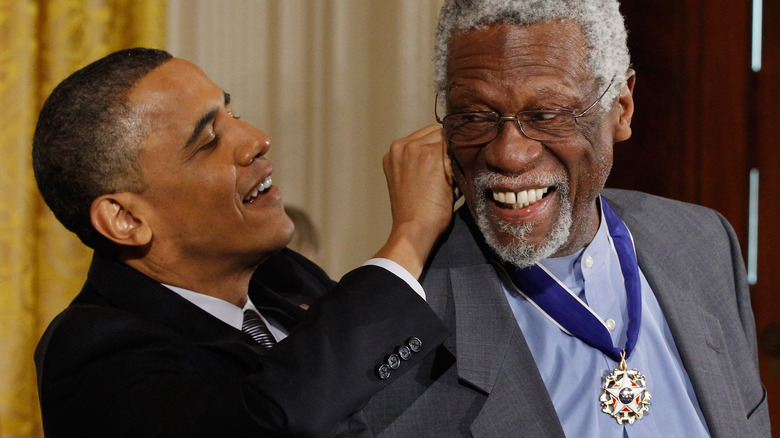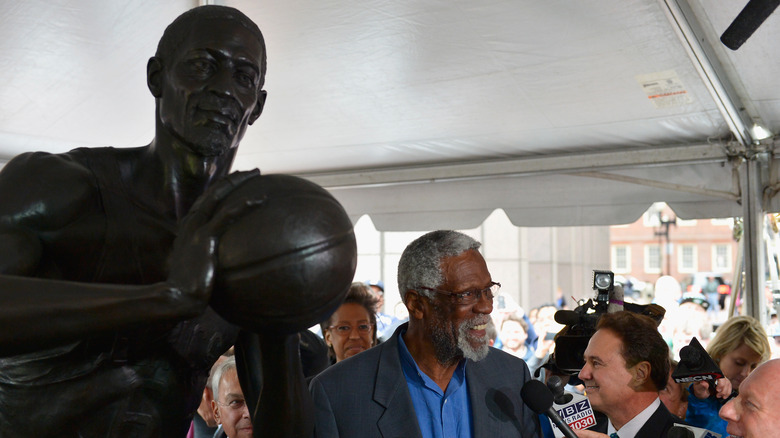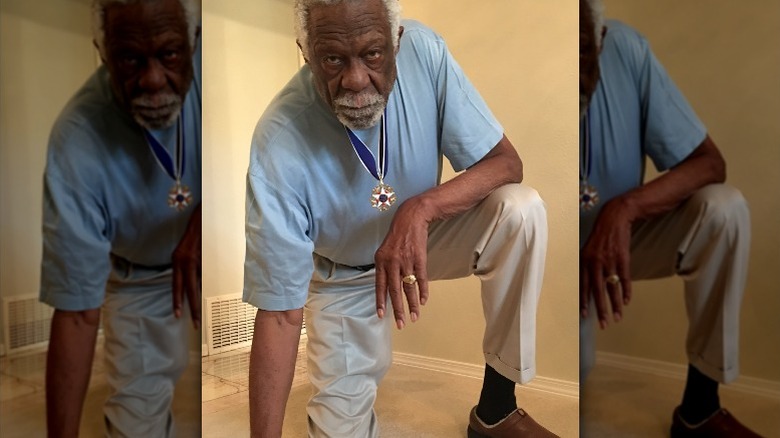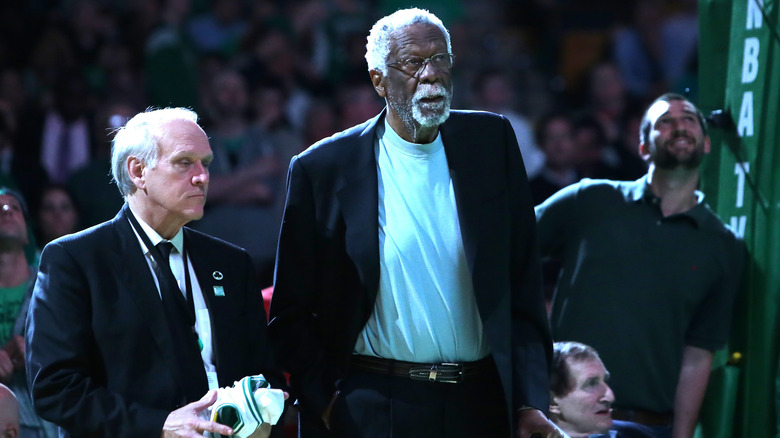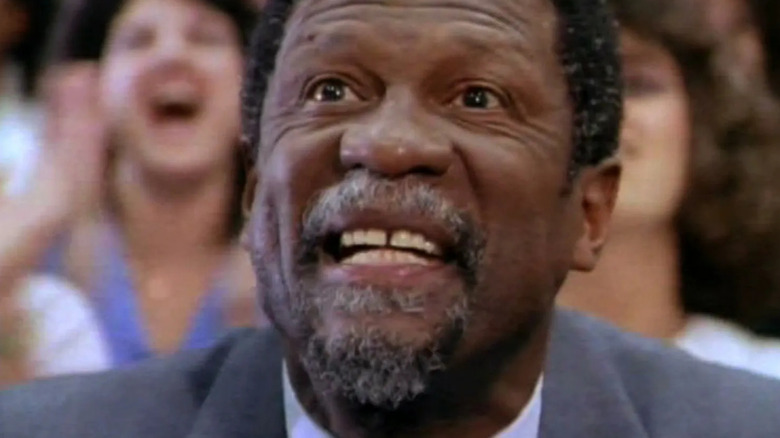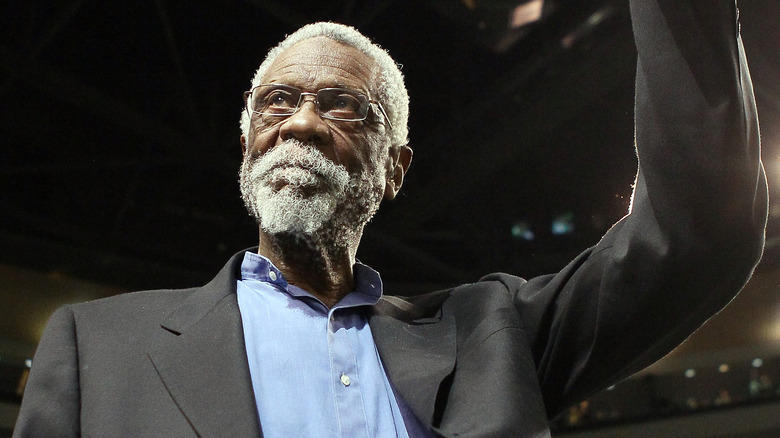The Untold Truth Of Bill Russell
Bill Russell was one of those rare superstars that excelled at nearly everything he committed himself to. He may be the most well-known for being a frequent MVP in the NBA who won an astounding 11 championships with the Boston Celtics, but there was so much more to the man than his impressive accomplishments on the court. Even as he was becoming one of the greatest basketball players of all time, Russell was a major figure in the civil rights movement and was part of some of the most historic moments of the era.
Once his athletic career had ended in 1969, Bill Russell remained incredibly productive, leading from the sidelines as a coach, along with various side projects like acting in film and TV. Behind his numerous exploits are fascinating tales of adversity and steely determination that have, and will continue to, inspire generations for years to come. These are some of the lesser-known aspects of the life of one of the most formidable, if not the most formidable, defenders of the NBA.
Bill Russell and Frank Robinson were on the same high school team
Even though Bill Russell would later become one of the greatest basketball players of all time, that was far from the reality when he was a teenager playing for McClymonds High School in Oakland, California. In fact, according to "King of the Court" by Aram Goudsouzian, throughout his sophomore year, Bill Russell rarely played at all and mostly just sat on the bench. Then, over the following two years, his basketball game improved considerably, especially his defensive abilities, but he was still outshone by his fellow teammate, Frank Robinson.
Years before he became a baseball player for the Cincinnati Reds (and future first-ballot Hall of Famer), Robinson played high school basketball alongside Russell. And in 1953, right before Charlie Eckman took the job as head coach of the Fort Wayne Pistons, he came to McClymonds to scout for Robinson, not Russell. To explain his reasoning, the coach said, "Frank Robinson could do it all. He was All-NBA as a high schooler. Russell could play defense, but Robinson could do everything" (via The Baltimore Sun).
The Olympic champion could have competed in the high jump instead
After two successful seasons at the University of San Francisco, winning the national championship both in 1955 and 1956, Bill Russell went on to secure an even greater victory at the 1956 Summer Games in Melbourne, Australia. As part of the U.S. national basketball team, Russell helped to defeat the Soviet Union, winning the U.S. a gold medal (via the United States Olympic & Paralympic Museum).
Participating in the Olympics was a major goal for Russell, and he so relished the opportunity, that he would have done anything to make it happen, even if that meant competing in an entirely different sport. At the time, that prospect was not so strange because even though Russell was becoming an incredible basketball player, that was not the limit to his athletic abilities.
During the summers while enrolled at USF, Russell had joined track and field as well, competing in both the 400 meters and the high jump. In his memoir, "Go Up for Glory," Russell explained the decision and said, "Only varsity letterman received a button-down sweater. I needed a button-down sweater. The second reason was that I liked to run and jump." Although his participation in track and field was certainly secondary to his basketball career, Russell would've used his high-jumping skills instead if it was the only way to get into the Olympics (via the Academy of Achievement).
He marched with Martin Luther King Jr.
Bill Russell had an impressive record not just as a basketball player, but more importantly, as a civil rights activist. One of the most important moments of his life was when he met with Dr. Martin Luther King Jr. in Atlanta and took part in the pivotal March on Washington in 1963. In his memoir, "Go Up for Glory," Russell recalled, "Dr. King asked me to sit on stage with him at a pre-march rally. I declined, feeling I would be a distraction. I sat in the second row as Dr. King delivered his famous 'I have a dream' speech."
The violent end to the civil rights leader's life in 1968 caused Russell's mentality to diverge from that of Dr. King's, according to the Academy of Achievement. The assassination was a terrifying event for many in the country, especially African Americans, so it's understandable that Russell shifted to support the rights of his fellow citizens to defend themselves against similar violence. Even though this viewpoint made some enemies, the pro athlete remained defiant.
The FBI kept a file on the basketball star
No matter how well he played on the court, Bill Russell experienced a lot of discrimination from white fans, with the common explanation being that the star's sour attitude was the cause. Even as Russell was leading the Boston Celtics to several NBA titles, the stadium was never packed with fans, and much worse was the hate mail Russell received over time, per the Academy of Achievement. Reporters didn't help the situation as they insisted that all Russell had to do was be more humble and smile more often. Russell was not interested in playing that game though and saw no reason to be kind to people that treated him so poorly, along with many other African Americans.
On top of harassment from racist fans and insults from reporters, Russell faced discrimination from the FBI as well. Most likely due to his connection with Dr. Martin Luther King Jr. and other leaders of the civil rights movement, the agency kept a file on the athlete, which was quite insulting. In his book, "King of the Court," author Aram Goudsouzian stated that a segment of the file called Russell "an arrogant Negro who won't sign autographs for white children."
His brother, Charlie, was a respected playwright
Bill Russell was not the only talented member of the Russell family as his older brother, Charlie Louis Russell Jr., also made a name for himself in his own way. Charlie never reached the same level of fame as Bill but had a successful career as a writer, as told in Russell's biography "King of the Court." When describing Charlie Russell's work, law professor Katheryn Russell-Brown told The Mercury News, "He believed the real heart of the stories about the Black community were in the lives of everyday working folks. Not just stories of oppression and the downtrodden, but stories about how people kept moving forward and made a difference."
According to the San Jose daily, in 1969, Charlie's hit play "Five on the Black Hand Side" debuted at the American Place Theatre in New York City. The comedy centered on a family in Harlem and addressed both the political and generational conflicts of the time. After a successful off-Broadway run, the production became the only one from that theater to ever become a film in 1973.
He was the first African American to coach an NBA team
After winning eight championships in a row, the Boston Celtics had a dilemma because their great coach, Red Auerbach, was ready to retire. But before Auerbach could leave, it was imperative that he find a replacement his star player and good friend, Bill Russell, approved of. As the two considered options, it would eventually become clear to Auerbach on who the new leader should be.
While on the road during Auerbach's final season, the coach suggested that Russell take the job as both a player and coach. At first, Russell thought it was a joke, but Auerbach was serious. Upon thinking it over, Russell accepted and not only became the new head coach of the Boston Celtics, but he remained one of the team's best players as well.
Though far more significantly, however, Russell also became the first African American to lead a team in one of the U.S.'s four major league sports, per the Academy of Achievement. According to "King of the Court," Russell was humble upon accepting the role and didn't want to compare what he had done to the massive achievement of Jackie Robinson, who was literally the only African American in an entire major league.
However, Russell hoped to have set a precedent toward necessary change and was quoted as saying (via "King of the Court"), "This is part of the thing Robinson did. It is part of the same story. Now maybe there will be some more Negro coaches and managers in sports."
He supported Muhammad Ali during Vietnam War controversy
The Vietnam War was a turbulent time in U.S. history and several prominent figures were vehemently opposed to the conflict. Some outspoken critics made it clear that they would not serve in the military if drafted, no matter the consequences, and one notable example was Muhammad Ali. In 1967, not only did the heavyweight champion lose his title after refusing to fight in the war (via the Calgary Herald) because of his religious beliefs, but he also was banned from boxing for three and half years, per History.
There were athletes that distanced themselves from the Muslim boxer, but there were also those who came to his defense. Chief among them was Bill Russell, along with other pros like Jim Brown and Kareem Abdul-Jabbar. In a press conference with Ali and his supporters, Russell stated it was important for him to meet the boxer to see his perspective, and upon doing so, he had made the right decision to come to his aid (via Celtics All Access on CLNS).
Russell was the first NBA player to visit Africa
By 1959, Bill Russell had the opportunity to make his first trip to Africa, which was both a personal milestone as well as an international one since he was the first NBA player to do so, per the Academy of Achievement. The continent was also undergoing a revolutionary period as decolonization movements were occurring in many countries.
The pro athlete traveled to Libya, talked with Emperor Haile Selassie in Ethiopia, and answered the questions of a classroom full of students in Liberia. When one student asked why he went to Africa, Russell replied, "I came here because I believe that somewhere in Africa is my ancestral home. I came here because I am drawn here, like any man, drawn to seek the land of my ancestors" (via Bleacher Report). When the students cheered at his response, tears streamed down his face. That heartfelt moment and other experiences led Bill Russell to visit Africa often and eventually purchase a small rubber plantation in Liberia.
Barrack Obama awarded him the Presidential Medal of Freedom
Bill Russell not only made a huge impact on the civil rights movement in the U.S., but he also took major steps to bring people together on nearly every continent. Over decades, Russell led basketball clinics in 50 different countries. For his great efforts in promoting peace for people both nationally and globally, the lifelong activist was awarded the Presidential Medal of Freedom by President Barack Obama in 2011, per ESPN.
When presenting Russell with the award, Obama noted that his achievements off the court had far more significance to humanity than his spectacular basketball skills. "Bill Russell, the man, is someone who stood up for the rights and dignity of all men," the president said. "He marched with King; he stood by Ali. When a restaurant refused to serve the Black Celtics, he refused to play in the scheduled game. He endured insults and vandalism, but he kept on focusing on making the teammates who he loved better players and made possible the success of so many who would follow" (via Politico).
The basketball star made amends with Boston
After the way that Bill Russell was treated by the people of Boston for so many years, he, understandably, had a love/hate relationship with the city. Even though the player had much respect for the Celtics franchise and had built strong relationships with those in it, the same could not be said for a majority of the team's fans and it would take decades before Bill Russell's mind would change about most of them.
A big sign of his lasting anger was the fact that Russell had no interest in attending the ceremony in 1999 when the team honored him by retiring his number, as reported by The Boston Globe.
Yet by 2008, the old grudge had finally died away as Russell was the chosen recipient of Boston's Leadership Award at the third annual "We Are Boston" ceremony. Both the award and the long, standing ovation he received helped greatly change his opinion about the city.
He supported players taking a knee
Later in life, Bill Russell remained an ardent advocate for civil rights and did what he could to support athletes who pursued similar change. For example, he would show his support for players like Colin Kaepernick, who chose to take a knee during the national anthem in protest of racism. He did so especially after the players were attacked for their stance by President Donald Trump and many others. Russell told ESPN at the time, "What I wanted was to let those guys know I support them. I wanted them to know they are not alone."
One major way Russell achieved his goal was by posting a powerful picture of himself on Twitter (pictured above). Not only did he take a knee, but he also wore his Presidential Medal of Freedom as well. Underneath was the message, "Proud to take a knee, and to stand tall against social injustice." Understandably, the image rapidly spread throughout social media to reach a massive audience.
There is a popular phrase about Bill Russell in Chile
According to sports correspondent Dave Zirin, in a contributing post to HuffPost in 2010, in a Chilean village on an island off the coast, there is a phrase, "Esta cosa es Bill Russell," which translates to "This thing is Bill Russell." While studying in the country in 1995, Zirin learned that the saying meant that whatever was being discussed was true without any doubt.
Even though Russell has proven to be a man of great integrity and honesty time and time again, the origin of the phrase actually had very little to do with the famous athlete. It all started when two men in the village were talking about Russell and one of them stated that he went to the University of San Francisco.
The other man disagreed and thought the pro attended UCLA instead. A long argument ensued until the duo could travel across the water to the nearby town and discover who was correct. After proving that Russell did go do USF, "This thing is Bill Russell" became the popular way of telling others they were right without wasting so much time debating the matter.
Russell made a notable cameo on 'Miami Vice'
While he thoroughly dominated the basketball court for 13 seasons, Bill Russell didn't branch out into other forms of entertainment very often. However, his role in an episode of "Miami Vice" surprisingly proved he had impressive skills as an actor as well. The episode titled "The Fix" aired in 1986 and Russell played a corrupt judge, Roger Ferguson, who took bribes from gangsters in order to pay off his large debts.
Of note, Russell was not the only basketball star to feature in the story, as Bernard King was cast in the role of his son. Unfortunately, after the best season of his career, King was sidelined for the entire 1985-86 season, according to Deadspin. This left him free to play the part, yet neither athlete continued their involvement in film or TV afterward. Russell went on to coach the Sacramento Kings in 1987, per NBC Sports, while King returned to play for the New York Knicks.
The Hall of Famer waited decades to accept his ring
In 1975, Bill Russell was inducted into the Basketball Hall of Fame, yet when the ceremony was held, he didn't attend. Decades later, the legendary athlete revealed in a tweet that a major reason for his absence was that he didn't feel worthy of the honor of being the first African American to be inducted.
Russell would wait some 44 years to accept the career honor. As reported by NBA.com, the legendary player finally accepted his Hall of Fame ring in 2019, the same year that Chuck Cooper — the first Black player drafted into the NBA in 1950 — received his (via ESPN).
In his HOF tweet, Bill Russell announced that he finally held a private ceremony with close family and friends to accept the honor, including Bill Walton, Alonzo Mourning, and Ann Meyers. The longtime civil rights activist was clearly happy with the events and added, "Good to see progress" with regard to Cooper's induction (via Twitter).
